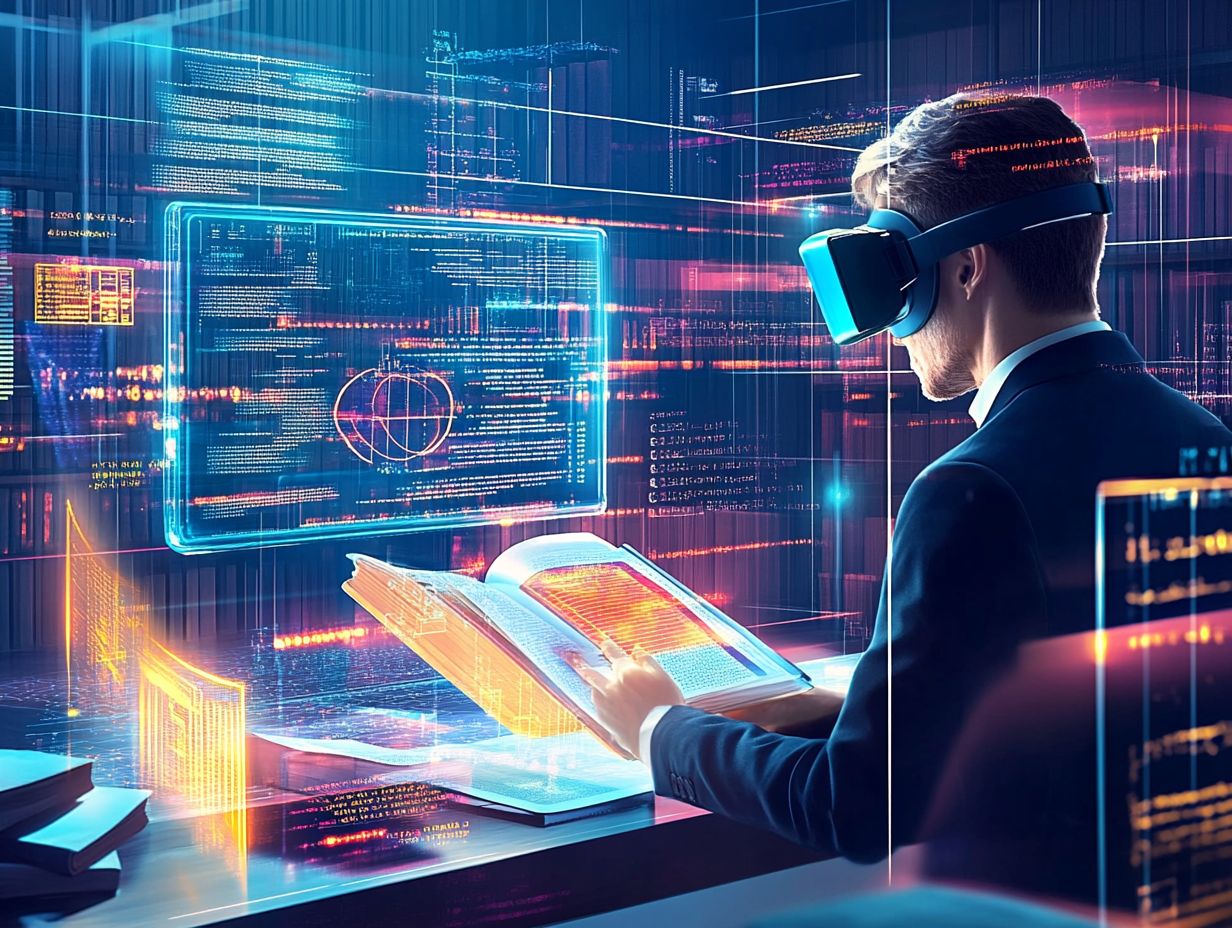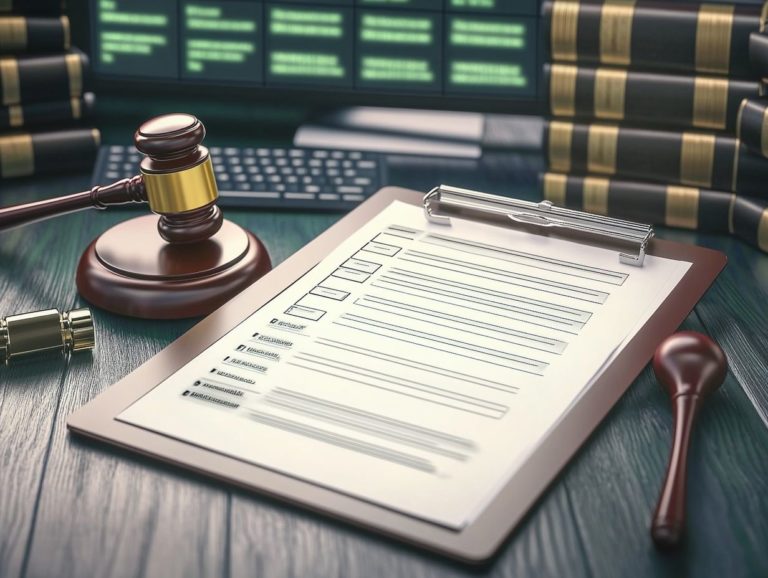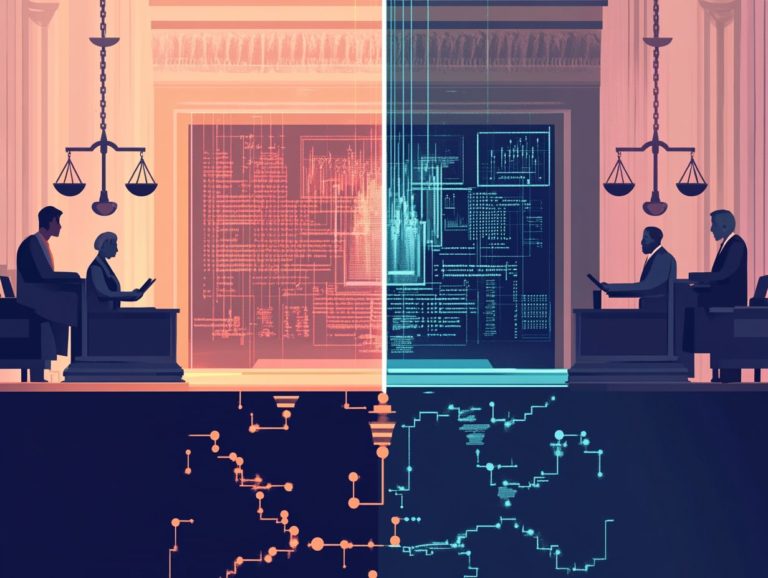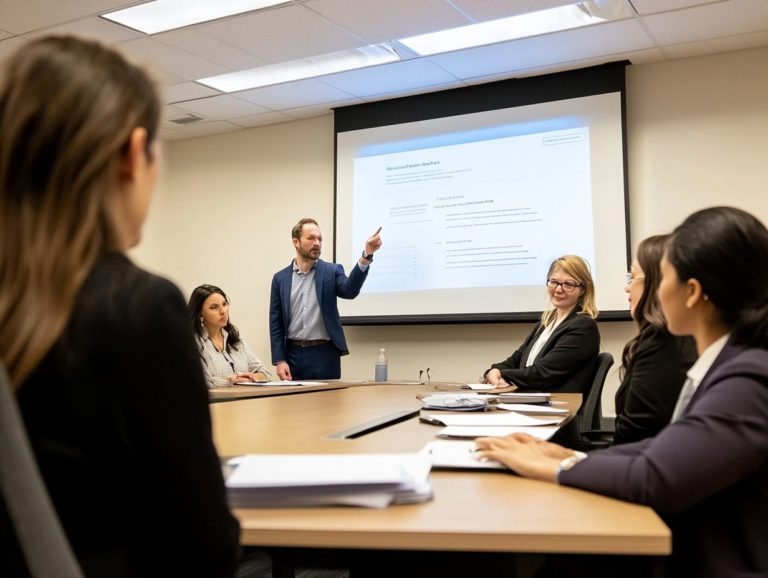5 Legal Technologies Reshaping IP Litigation
The landscape of legal battles over intellectual property is undergoing a significant transformation, fueled by innovative legal technologies. From streamlining patent searches to enhancing copyright protection, these advancements are not merely improving efficiency; they are redefining how you, as a legal professional, approach complex cases.
This article delves into five transformative technologies predictive analytics, blockchain, virtual reality, and cloud computing and evaluates their benefits, limitations, and ethical considerations.
Discover how these tools are reshaping the future of IP litigation and what this evolution entails for you and your law firm as you adapt to this digital era.
Contents
- Key Takeaways:
- 1. Artificial Intelligence in Patent Search and Analysis
- 2. Predictive Analytics for Case Outcome Prediction
- 3. Blockchain for Copyright and Trademark Protection
- 4. Virtual Reality for Courtroom Demonstrations
- 5. Cloud Computing for Data Storage and Management
- How Are These Technologies Changing the Landscape of IP Litigation?
- What Are the Potential Drawbacks and Limitations of These Technologies?
- How Can Lawyers and Law Firms Adapt to These Changes?
- What Are the Ethical Considerations with Using These Technologies in IP Litigation?
- What Does the Future Hold for Legal Technologies in IP Litigation?
- Frequently Asked Questions
- What are the top 5 legal technologies reshaping IP litigation?
- The top 5 legal technologies reshaping IP litigation
- How is artificial intelligence (AI) being used in IP litigation?
- What is the role of blockchain in IP litigation?
- How are data analytics being utilized in IP litigation?
- In what ways is virtual reality being used in IP litigation?
- How is e-discovery impacting IP litigation?
Key Takeaways:
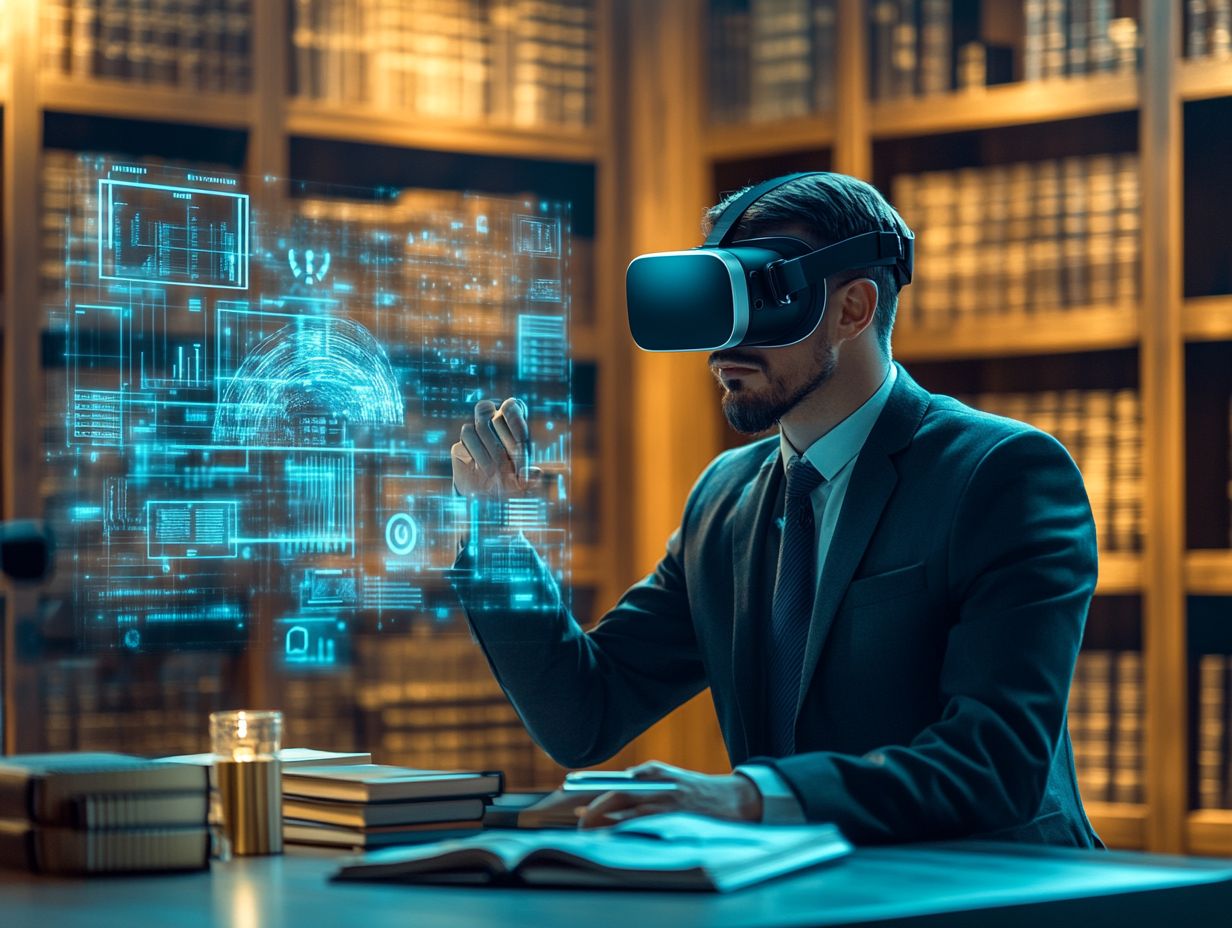
- AI makes patent searches faster and more accurate.
- Predictive analytics help lawyers forecast case outcomes.
- Blockchain secures copyright and trademark ownership.
1. Artificial Intelligence in Patent Search and Analysis
In 2023, you’re witnessing a remarkable transformation in the realm of IP law, thanks to the integration of Artificial Intelligence (AI) into patent search and analysis. This innovative technology enhances efficiency and accuracy, making your legal practice more effective than ever.
Not only does this advancement streamline your workflows, but it also elevates the management of your assets in an increasingly digital landscape where compliance and data privacy are critical.
AI tools can quickly analyze large databases, allowing you to conduct faster and more precise patent searches. This drastically cuts down the time traditionally spent on manual research. This newfound capability equips you to manage rights more effectively, ensuring that essential information is always at your fingertips when it matters most.
It’s vital for your legal practice to keep up with evolving technology. Failing to adapt could leave you trailing behind competitors. Transitioning to AI solutions may come with challenges. You may face obstacles such as:
- Initial implementation costs
- The necessity for specialized training
- Potential pushback from team members who are used to conventional methods
Overcoming these obstacles is essential for a successful integration into your practice.
2. Predictive Analytics for Case Outcome Prediction
Predictive analytics is revolutionizing IP litigation by enabling you to forecast case outcomes with remarkable accuracy. This allows for more well-considered choices in your legal strategies and client consultations.
By harnessing large datasets and advanced algorithms, you can uncover patterns that reveal how similar cases have been resolved in the past. This predictive ability not only aids in your risk assessment but also enhances your capacity to develop tailored strategies that cater precisely to your clients’ needs.
Firms that embrace these analytics tools have reported heightened success rates in litigation, ultimately cultivating stronger trust and loyalty among clients.
As the legal landscape increasingly leans toward data-driven insights, those who integrate these innovative methodologies are poised to gain a competitive edge, shaping future engagements and nurturing enduring client relationships.
3. Blockchain for Copyright and Trademark Protection
The advent of blockchain technology is transforming the landscape of copyright and trademark protection. It offers secure and transparent frameworks that enhance compliance with intellectual property laws in today s digital economy.
By using decentralized record systems, you can track intellectual property rights in real-time, allowing creators to authenticate their work with unparalleled precision. This innovative approach enables legal firms to elevate their management of client portfolios, equipping them with tools for improved verification and traceability of assets.
However, navigating the complexities of blockchain integration comes with its own set of challenges. You ll need to consider the technical expertise required and the potential costs involved in transitioning to this robust solution.
Stay informed about changing regulations to guide your clients effectively and maintain your edge.
4. Virtual Reality for Courtroom Demonstrations
Virtual reality (VR) is quickly becoming an invaluable asset in courtroom demonstrations. It offers immersive experiences that can transform how complex IP litigation scenarios are presented to judges and juries.
Imagine stepping into a 3D environment where you can interact with evidence. This exciting approach lets courtroom participants vividly see critical moments that traditional methods might fail to convey effectively.
For law firms, this method streamlines communication of intricate ideas and bolsters the persuasiveness of arguments. As consumer experiences evolve with advancing technology, the dynamics of the courtroom are shifting, fostering a more interactive atmosphere that promotes a deeper understanding of the issues at play.
Embracing this technology can lead to more informed verdicts, ultimately reshaping perceptions of justice and how it is delivered.
5. Cloud Computing for Data Storage and Management
Cloud computing is transforming data storage and management for law firms. It offers scalable solutions that significantly enhance operational efficiencies, security, and collaboration, particularly in handling intellectual property cases.
This innovative approach enables you to store, access, and share sensitive IP data from anywhere with an internet connection. This ensures a smooth workflow in the fast-paced legal environment you navigate daily.
Using advanced encryption and multi-factor authentication can strengthen the security of your clients’ information, reducing the risks of data breaches.
The decreased reliance on on-site infrastructure streamlines operations and leads to substantial cost savings. This allows you to redirect resources toward strategic initiatives that drive your firm forward.
Transitioning to a cloud-based system does require adherence to best practices, such as comprehensive training and establishing clear protocols. This ensures that compliance with current regulations remains robust throughout the process.
How Are These Technologies Changing the Landscape of IP Litigation?
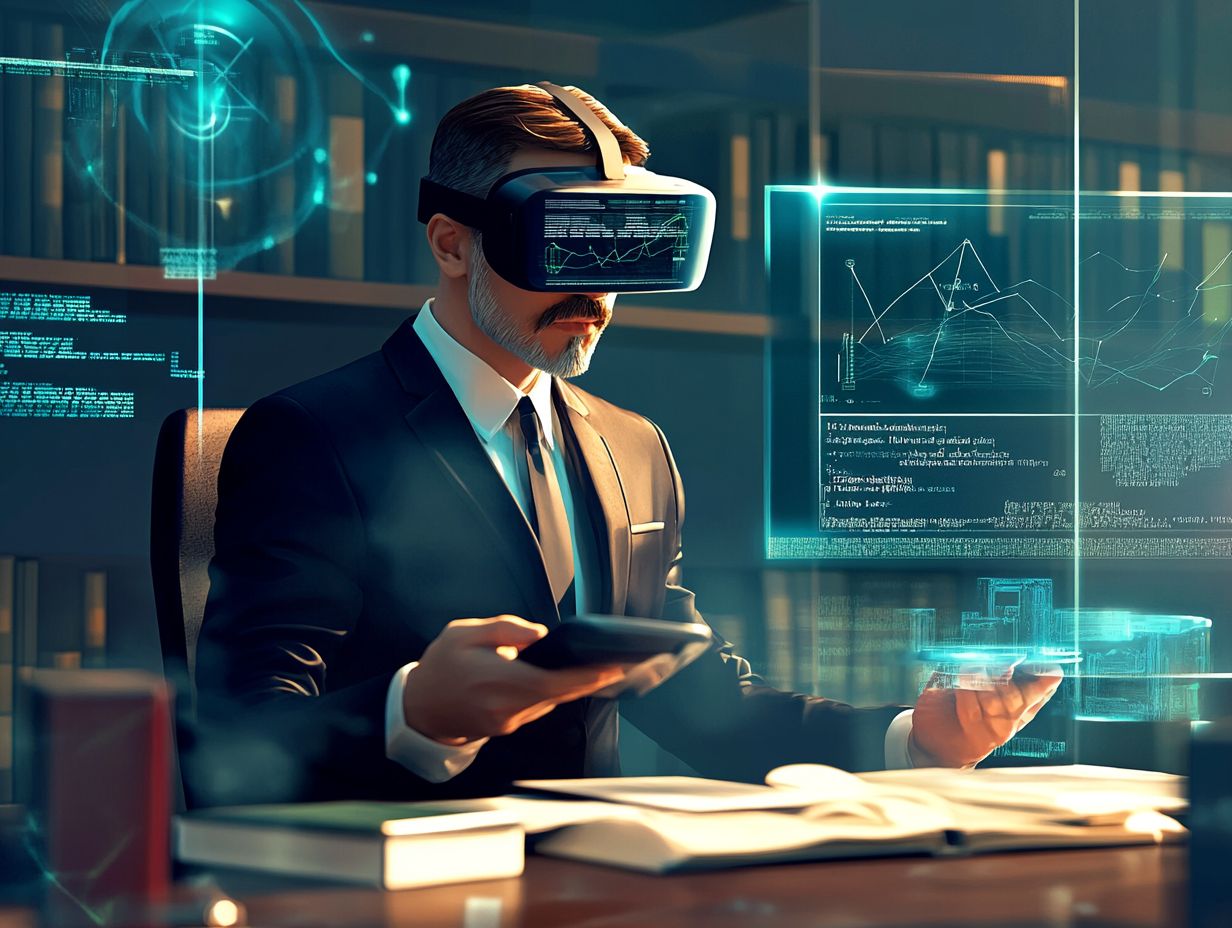
The rapid evolution of technologies such as AI, or artificial intelligence, blockchain, predictive analytics, virtual reality, and cloud computing is reshaping IP litigation. To navigate this landscape effectively, it’s crucial to understand the 5 must-know terms in IP litigation. These advancements present new strategies, efficiencies, and challenges for you as a legal professional in this dynamic environment.
These innovations aren’t merely enhancing traditional methods; they are pioneering entirely new approaches to case management and client interactions. For example, AI-driven tools can sift through vast amounts of data, pinpointing relevant precedents and potential outcomes at speeds no human can match.
While these tools promise improved efficiency and accuracy, they also raise important questions about compliance and data privacy. You must navigate a delicate balance, ensuring that you harness these advancements while adhering to ethical guidelines and safeguarding client confidentiality.
Real-world case studies illustrate the transformative potential of these technologies and the associated risks. They offer valuable insights into how firms like yours are adapting their operational frameworks to thrive in this new era.
What Are the Benefits of Using These Technologies in IP Litigation?
Utilizing technology in IP litigation presents a multitude of advantages, including enhancing efficiencies in case management and improving accuracy in data handling. For a deeper understanding of this topic, explore how to leverage technology for IP litigation. This enables you to offer more insightful consultations based on actionable data.
This transformation not only streamlines workflows but also dramatically cuts down the time you spend on legal research. This allows you to concentrate on strategy rather than getting bogged down by administrative tasks.
With advanced analytics tools at your disposal, you can explore case precedents with exceptional precision, increasing the chances of favorable outcomes.
Many industry experts, including legal technologist Jane Doe, underscore that “the integration of technology has revolutionized our approach to clients, enabling us to communicate more effectively and make smarter decisions.”
These advancements elevate the standard of advocacy, ultimately benefiting both attorneys and their clients alike.
To explore these technologies further, consider reaching out for more information on how they can enhance your practice.
What Are the Potential Drawbacks and Limitations of These Technologies?
While the integration of new technologies in IP litigation offers a wealth of advantages, it also presents a set of challenges and limitations that must be navigated with care, particularly considering the impact of digital transformation on IP litigation.
A heavy dependence on technology can create vulnerabilities if you become overly reliant on these tools. AI algorithms, while powerful, can inadvertently introduce biases, potentially skewing results in ways that compromise fairness.
Data privacy concerns add another layer of complexity, as the sensitive information gathered through digital platforms demands robust safeguards. You may also find yourself facing a steep learning curve when adapting to these innovations, which can divert attention from the traditional practices that define the legal profession.
You must find a balance between using technology and maintaining traditional legal expertise.
How Can Lawyers and Law Firms Adapt to These Changes?
To effectively navigate the swift changes introduced by emerging technologies in IP litigation, embrace new strategies and practices that align with these advancements. A great starting point is exploring the 5 most influential books on IP litigation, which provide valuable insights. This requires a commitment to continuous learning, ensuring you stay updated on the latest developments in both legal frameworks and technological tools.
Investing in advanced legal technology tools can streamline processes, enhance case management efficiency, and elevate client service. Collaborating with technology specialists not only enriches your firm’s expertise but also cultivates a culture of innovation, vital for navigating complex litigation landscapes.
Consider implementing specific strategies such as:
- Hosting regular training sessions
- Participating in technology-driven workshops
- Establishing partnerships with tech companies to create tailored solutions that address evolving client needs
What Are the Ethical Considerations with Using These Technologies in IP Litigation?
As technology continues to weave itself into the fabric of IP litigation, you’ll encounter numerous ethical considerations surrounding data privacy, regulatory compliance, and the implications of automated decision-making processes, which are highlighted in 5 lessons learned from major IP litigation cases.
These complexities necessitate that you not only grasp the technological tools available to you but also remain vigilant about your duty to uphold client confidentiality.
With the growing reliance on artificial intelligence for legal research and case predictions, it s essential to confront potential biases that could unintentionally influence outcomes.
Navigating laws like GDPR introduces an additional layer of responsibility, compelling you to ensure your data handling practices align with stringent privacy regulations.
In these scenarios, your role as a legal expert becomes paramount. You must balance embracing innovation with adhering to the ethical standards that define your profession.
What Does the Future Hold for Legal Technologies in IP Litigation?
The future of legal technologies in IP litigation is on the brink of transformative advancements. Get ready for a revolutionary shift in legal services, informed by the 5 major challenges in IP litigation today, that will redefine the delivery of legal services and the management of intellectual property rights in a global economy.
As you navigate this evolving landscape, you ll encounter a plethora of emerging technologies, such as blockchain for secure documentation and AI-powered tools for predictive analytics, which can significantly enhance decision-making processes.
The integration of machine learning a type of artificial intelligence that allows systems to learn from data in case management has the potential to streamline workflows, allowing you to focus more on the strategic aspects of litigation rather than getting bogged down in administrative tasks.
You need to adopt scalable solutions as automation grows and invest in training your team to adapt to these technological shifts. By embracing these trends, you can position yourself at the forefront of a legal revolution, ensuring you remain competitive in an ever-complex marketplace.
Frequently Asked Questions
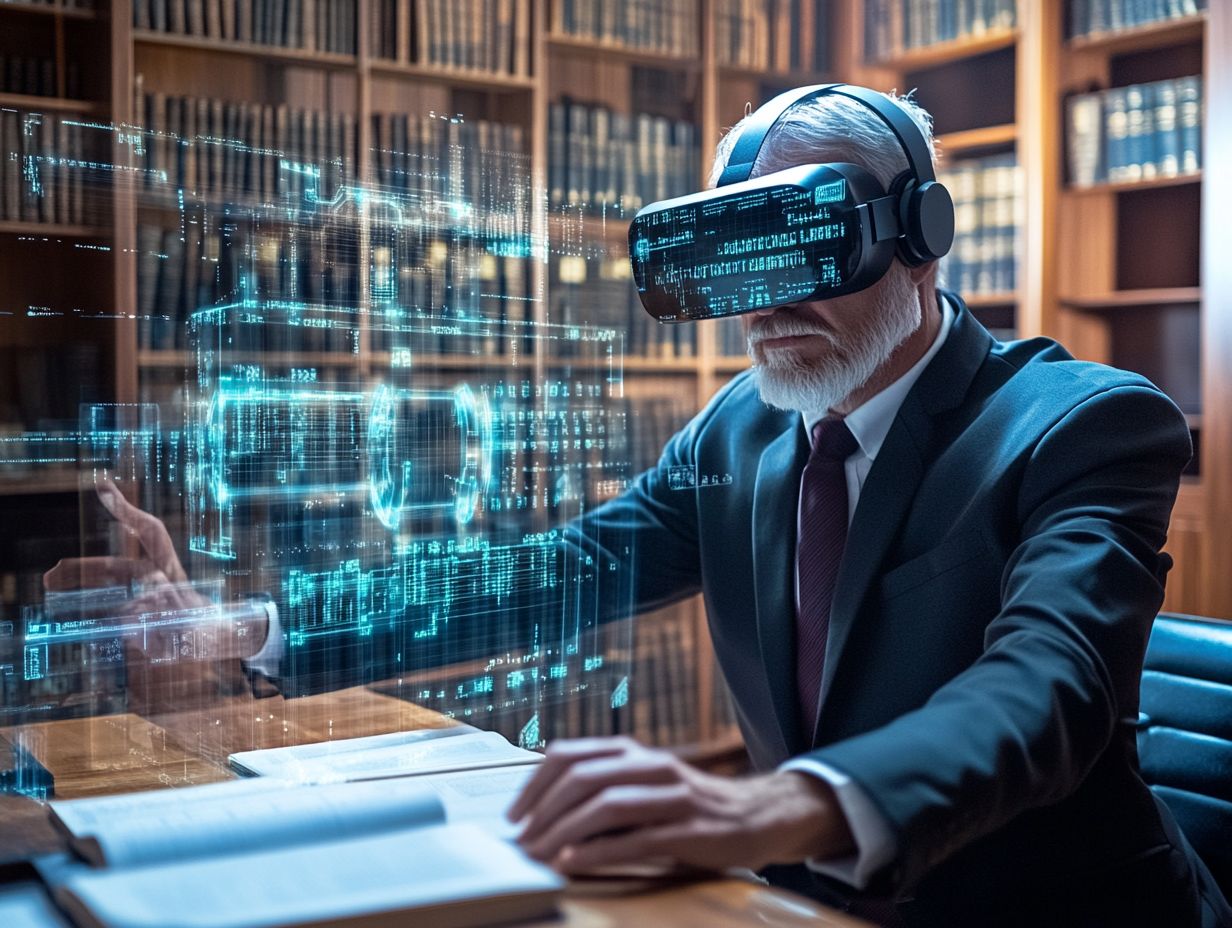
What are the top 5 legal technologies reshaping IP litigation?
Stay informed and adaptable to changes in legal technology to harness their full potential!
The top 5 legal technologies reshaping IP litigation
The top five legal technologies reshaping IP litigation are artificial intelligence (AI), blockchain, data analytics, virtual reality, and e-discovery. For a deeper understanding of these advancements, check out the article on recent trends in IP litigation. These technologies are revolutionizing how IP litigation cases are handled and resolved.
How is artificial intelligence (AI) being used in IP litigation?
Artificial Intelligence (AI) is changing the game in IP litigation! AI is used to analyze large volumes of data and predict case outcomes. It assists with legal research and document review, helping to identify potential IP infringements and support the drafting of legal arguments.
What is the role of blockchain in IP litigation?
Blockchain technology is transforming IP litigation by helping authenticate and track digital assets like patents and trademarks. For those navigating this landscape, following 5 tips for IP litigation success can be crucial in establishing the ownership and validity of these assets in IP cases.
How are data analytics being utilized in IP litigation?
Data analytics, the practice of analyzing data to uncover insights, is vital in IP litigation. This technology analyzes large amounts of information, including previous inventions (prior art), patent databases, and market trends. It helps lawyers and judges make informed decisions and strengthen their arguments.
In what ways is virtual reality being used in IP litigation?
Virtual reality creates immersive experiences for judges and juries, helping them better understand the technology involved in a case. It can simulate patent infringement or trade secret misappropriation scenarios, enhancing comprehension of complex issues.
How is e-discovery impacting IP litigation?
E-discovery is the process of finding and handling electronic information (ESI) in legal cases. In IP litigation, e-discovery helps lawyers locate and present relevant evidence like emails, documents, and social media posts, which are crucial in proving or defending against IP infringement claims.
